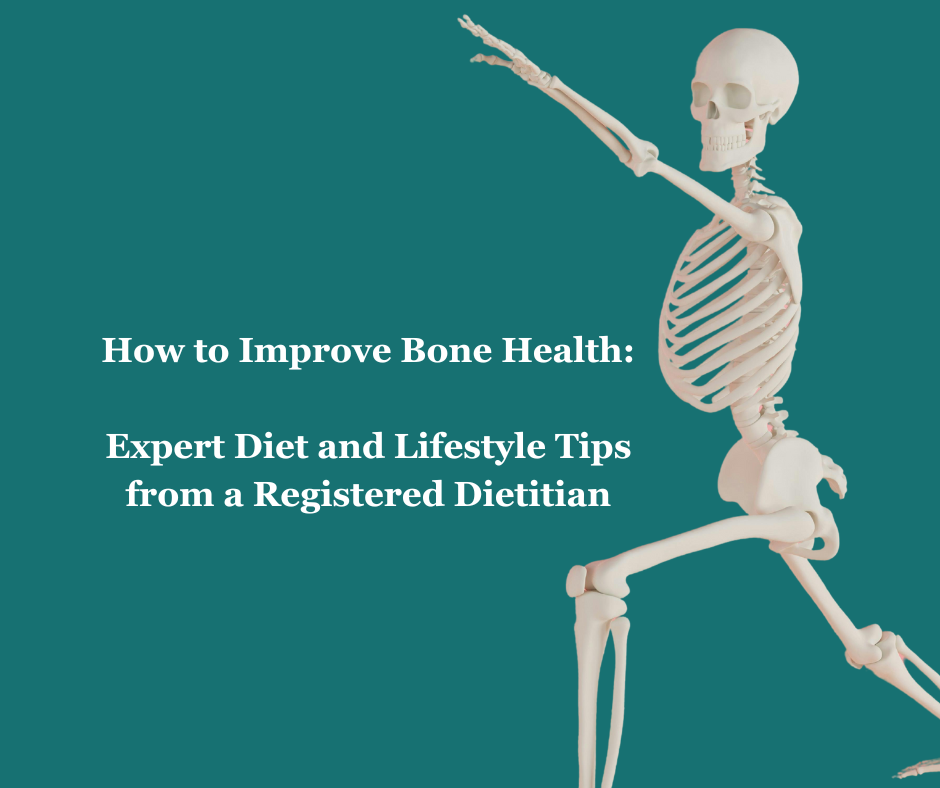Bone health plays a crucial role in maintaining your independence as you age, yet it’s often overlooked until issues arise. There are a number of conditions that can affect your bones, such as:
- Osteopenia
- Osteoporosis
- Osteomyelitis
- Rickets
In the UK, osteoporosis is the most prevalent, affecting more than 3 million people. Fractures caused by weakened bones are a major cause of disability and loss of independence, especially in older adults.
The good news? Bone health is something you can support through your diet and lifestyle. Let’s look at the latest evidence and practical tips to help you support bone health through diet and lifestyle.
What you need to know about bone health and its risk factors
Bones are living tissues that continually renew themselves. Peak bone mass is typically reached by our late 20s, after which gradual bone loss occurs—accelerated in women after menopause.
1 in 10 women over the age of 60 are affected by osteoporosis worldwide, with up to 20% of bone loss occurring during post-menopause. This is due to a reduction in estrogen, which helps prevent the natural breakdown of bones. The less estrogen, the greater the rate of bone loss (The Endocrine Society).
Risk factors for poor bone health include:
- Ageing
- Female gender (especially post-menopause)
- Family history of osteoporosis
- Sedentary lifestyle
- Poor nutrition
- Smoking and excessive alcohol use
If you want to find out if you are at risk of developing osteoporosis, the Royal Society of Osteoporosis has a risk checker which you can access here.
Nutrients and Vitamins for Bone Health
Several nutrients and vitamins are essential for building strong bones:
- Protein
- Calcium
- Vitamin D
- Magnesium
- Vitamin K
Protein
Why is protein important for bone health?
Protein is essential for bone structure and muscle strength, which helps prevent falls.
What the science says:
Consistent higher protein intake in older adults has been shown to improve bone and muscle strength, reducing the risk of falls, especially when combined with adequate vitamin D and calcium.
Evidence:
Recent studies show that higher protein intake, especially when combined with adequate calcium and vitamin D, supports bone mineral density and reduces fracture risk (Shams-White et al., 2017).
Sources of protein in the diet:
- Lean meats, fish, eggs
- Dairy
- Beans, lentils, tofu
However, I believe there is sometimes an overemphasis on protein. Most people are already eating enough protein. Protein requirements for those under 65 are 0.75g per kg of body weight, and for those over 65, it’s 1.2–1.5g per kg. If you’re over 65, you might be interested in reading my free 43-page eBook Live Independently for Longer, which gives more information on protein and portion sizes. You can access it here.
How much calcium do I need for my bones each day?
Why is calcium important for bone health?
Calcium is the primary mineral in bones, giving them strength and structure.
UK Recommendations:
- Adults (19+): 700 mg/day
- Adults (65+): 1000 mg/day
- Adolescents (11–18): 800–1,000 mg/day
- Osteoporosis or breastfeeding: Up to 1,000 mg/day
Top sources of calcium:
- Dairy products (milk, cheese, yogurt)
- Fortified plant-based milks
- Oily fish
- Leafy green vegetables
- Tofu set with calcium
- Nuts and seeds
How much is a portion of calcium containing foods?
1/3 pint (200mls) milk
125g (1 individual pot) of yoghurt
30g (matchbox size) piece of cheese
50g Soya bean curd/tofu (only if set with calcium chloride (E509) or calcium sulphate (E516), not nigari)
1/2 tin of sardines
If you are using non-dairy alternatives then ensure that they are fortified with calcium. If you would like more informaton on calcium. please visit the British Dietetic Association Information page.
Tip: Spread your calcium intake throughout the day for optimal absorption.
Vitamin D
Why is vitamin D important for bone health?
Vitamin D helps your body absorb calcium and supports bone growth and repair.
UK Recommendations:
- All adults: 10 micrograms (400 IU) daily, especially in autumn and winter
Sources:
- Sunlight (main source in the UK, but limited in winter)
- Oily fish (salmon, mackerel, sardines)
- Eggs
- Fortified foods (breakfast cereals, spreads, plant-based milks)
Vitamin D supplements for bone health
Vitamin D supplements of 10 µg are recommended for everyone during autumn and winter, or year-round for those with limited sun exposure (housebound, or those who avoid skin exposure for religious reasons or those with darker skin).
Magnesium
Why is magnesium important for bone health?
Magnesium supports the formation of bone structure by helping calcium to be absorbed into bones and activating vitamin D.
Sources:
- Whole grains
- Nuts, seeds
- Leafy greens
Adequate magnesium intake (270mg/day for women and 300mg/day for men) has been shown to improve bone mineral density in the hip and femoral neck (Groenendijk, et al., 2022).
Magnesium supplements for bone health:
As a Registered Dietitian, I always recommend getting most nutrients from food. Magnesium citrate, glycinate, and carbonate support bone health and tend to cause fewer gut issues than magnesium oxide. Never take more than the recommended intake—more is NEVER better when it comes to supplements!
Vitamin K
Why is vitamin K important for bone health?
Vitamin K is vital for bone formation by binding calcium into the bones.
Sources:
- Leafy greens
- Cereal grains
- Vegetable oils
Vitamin K deficiency is rare, and vitamin K is stored in your liver, so you don’t need to eat it every day. Since vitamin K is involved in clotting, it’s not advisable to take supplements if you’re on anticoagulant medication.
Should I take Vitamin K supplements for my bones
Currently there is not enough evidence to support taking Vitamin K for your bone health, despite all the supplements containing both Vitamins D & K (Hamidi et al, 2013). We DO have strong evidence that Vitamin K is synthesised in the gut – so another reason to look after your gut health!
Vitamin K can also impair the absorption of anti-coagulant medications.
Best Diet for Bone Health
While individual nutrients are necessary for bone health, overall dietary patterns have the greatest impact. A Mediterranean-style diet, rich in fruits, vegetables, whole grains, and healthy fats, is linked to higher bone mineral density and a lower risk of fractures. The gut-bone axis is now recognized as important in developing healthy bones.
Your gut thrives on a diverse range of plant foods, supporting various gut bacteria that produce beneficial compounds to reduce inflammation and promote bone formation.
Lifestyle Factors for Bone Health
Exercise
All adults should aim to be physically active each day and reduce the amount of time spent sitting.
Recommendations for adults aged 19–64:
- 150 minutes of moderate activity or 75 minutes of vigorous activity each week
- Two weight and strengthening exercises at least twice a week to help build bone mass and improve muscle strength
For more details on exercise guidelines, visit the NHS website here.
Smoking
Smoking increases the risk of osteoporosis, bone loss, and broken bones. If you’re looking for help quitting, contact your local pharmacy to learn about available support.
Alcohol
Excessive alcohol intake harms bone health. Aim to keep alcohol consumption to no more than 14 units per week, spread over at least 3 or more days, with several free days in between. For more information on alcohol, check out Drinkaware’s guidelines.
Top 7 Tips for Supporting Bone Health
- Aim for 3 servings of calcium-rich foods daily for those aged 19–64 and 4 servings for those over 65.
- Get outside for 10–15 minutes of sunlight (spring/summer), avoiding peak sun hours (11 am–3 pm).
- Take a 10µg vitamin D supplement from September to May.
- Eat a variety of fruits, vegetables, and whole grains.
- Eat fish twice a week, one of which should be oily fish.
- Choose fortified plant-based alternatives if avoiding dairy.
- Stay active with regular weight-bearing exercise.
Supporting bone health is crucial for maintaining independence and quality of life as you age. With the right dietary choices, exercise, and lifestyle habits, you can protect your bones and reduce the risk of fractures. By focusing on a well-rounded, nutrient-rich diet and staying physically active, you can actively promote strong bones and overall health.
Are over 65? Did you know that your diet needs to change a little after 65? If you would like to find out more then why not get your FREE copy of my eBook – Live Independently for Longer
Remember, small changes can make a big difference. Incorporating a variety of calcium-rich foods, ensuring adequate vitamin D intake, and staying consistent with exercise are all steps that can support your bone health now and into the future. If you’re feeling unsure about how to make these changes, don’t hesitate to reach out for personalized advice. Contact me today
If you have found this article useful then you might also enjoy Heart health made simple: 7 key ways to protect your heart

Fiona Brannigan, BSc (Hons) Human Nutrition & Dietetics, HCPC-Registered Dietitian, Full member of the British Dietetic Association
Fiona Brannigan is a UK-registered dietitian and founder of Inspirit Nutrition & Dietetic Consultancy, based in Ayrshire and working with clients across the UK. With over 25 years of experience, including more than two decades in the NHS, Fiona has supported thousands of people to improve their health through nutrition.
Her expertise spans gut health, menopause nutrition, digestive disorders, neurological conditions, and rehabilitation following illness. Fiona is particularly passionate about helping adults aged 50+ regain confidence and control over their gut health, manage symptoms such as bloating, constipation, and diarrhoea, and enjoy food without fear or discomfort.
Fiona is regulated by the Health and Care Professions Council (HCPC) and is a member of the British Dietetic Association (BDA). She offers one-to-one consultations online and in person, using evidence-based nutrition and personalised support to help people feel their best at every stage of life.
Book a free discovery call to discuss your gut health goals or learn more about Fiona’s work

